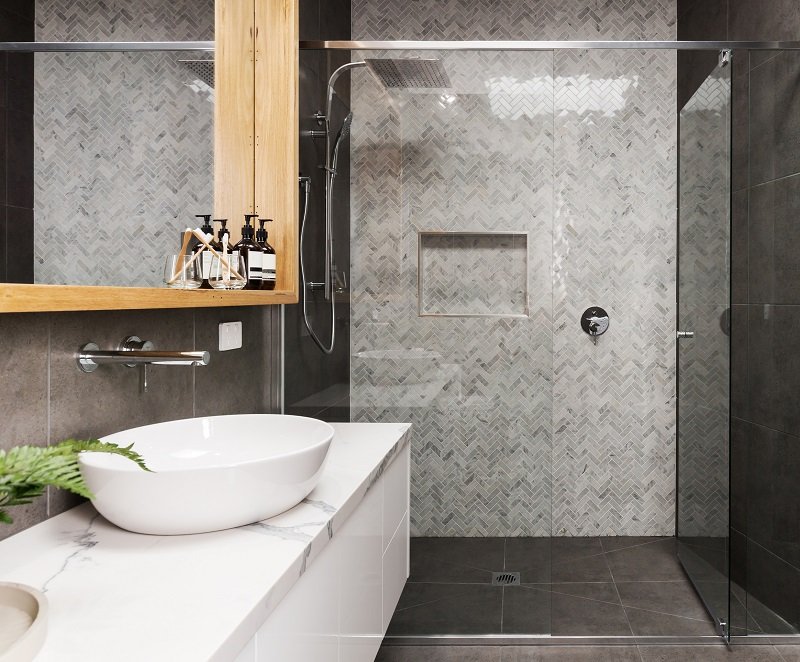Alternatives to Tile Shower: Top Wall Options for Your Bathroom

When it comes to designing or renovating a bathroom, the choice of materials for the shower walls is crucial not only for the overall aesthetics but also for the functionality and longevity of the space. Traditionally, tiles have been the go-to option for many homeowners due to their durability and water-resistant properties. However, the grout lines between tiles can become a breeding ground for mold and mildew, requiring regular maintenance. Moreover, the installation process of tiles can be time-consuming and costly. As a result, many are seeking alternatives to tile shower walls that are easier to maintain, quicker to install, and can offer a unique look to their bathroom. In this article, we will explore several top wall options that serve as excellent alternatives to tile shower walls, each with its own set of benefits.
Exploring Acrylic Panels
Acrylic panels are one of the most popular alternatives to tile shower walls due to their seamless appearance and ease of maintenance. These panels are made from a type of plastic that is highly durable and resistant to mold and mildew. Unlike tiles, acrylic panels do not require grout, which means they are significantly easier to clean and maintain. Additionally, acrylic panels come in a wide variety of colors and patterns, including options that mimic the look of natural stone or tiles, providing homeowners with the flexibility to match their bathroom's aesthetic. The installation process of acrylic panels is also straightforward and can often be completed in a single day, making it a convenient option for those looking to quickly update their bathroom.
The Versatility of PVC Panels
PVC panels are another excellent alternative to tile shower walls, known for their versatility and water-resistant properties. These panels are made from polyvinyl chloride, a type of plastic that is lightweight yet durable. PVC panels are available in a wide range of designs, from simple solid colors to intricate patterns that can add a decorative touch to any bathroom. One of the main advantages of PVC panels is their ease of installation. They can be easily cut to size and attached to the wall using adhesive, making them a great DIY option. Furthermore, PVC panels are highly resistant to moisture, making them an ideal choice for shower walls.
Elegance of Marble
For those looking for a more luxurious alternative to tile shower walls, marble is an excellent choice. Marble has been used in bathrooms for centuries due to its timeless beauty and elegance. Each piece of marble is unique, with its own patterns and veining, ensuring that no two marble showers will ever look exactly the same. While marble is more expensive than some other options, it can add significant value to a home and create a stunning focal point in the bathroom. However, it's important to note that marble requires more maintenance than some other materials, as it needs to be sealed regularly to prevent staining and water damage.
Stainless Steel Decorative Panels: A Modern Twist
Stainless steel decorative panels offer a modern and sleek alternative to tile shower walls. These panels can provide a contemporary look to any bathroom, reflecting light and creating a sense of spaciousness. Stainless steel is also highly durable and resistant to corrosion, making it an ideal material for the humid environment of a shower. Additionally, stainless steel panels are easy to clean and maintain, requiring only a simple wipe down to keep them looking shiny and new. While stainless steel panels can be more expensive than some other options, their durability and modern aesthetic make them a worthwhile investment for those looking to create a contemporary bathroom.
Stone Resin Panels: Durability Meets Style
Stone resin panels are a composite material made from a mixture of natural stone and resin, offering a perfect balance between durability and style as an alternative to tile shower walls. These panels have the appearance of natural stone but are lighter and easier to install. Stone resin is non-porous, making it resistant to stains, scratches, and water damage. Additionally, stone resin panels are available in a variety of colors and patterns, allowing homeowners to achieve the look of natural stone without the high cost and maintenance. The seamless installation of stone resin panels also means there are no grout lines, reducing the risk of mold and mildew buildup and making them easier to clean.
Innovative Wood Shower Walls
Wood shower walls can provide a warm and natural look, making them a unique alternative to tile shower walls. When properly treated and sealed, wood can be made water-resistant and suitable for use in a shower. There are various types of wood that can be used, such as teak, cedar, or bamboo, each offering its own unique grain and color. Wood shower walls can create a spa-like atmosphere in a bathroom, adding a touch of nature and relaxation. However, it's important to note that wood shower walls require regular maintenance to keep them in good condition and prevent water damage.
The Practicality of Fiberglass
Fiberglass is a practical and cost-effective alternative to tile shower walls. It is made from a type of plastic reinforced with fine glass fibers, making it lightweight yet durable. Fiberglass shower walls are molded into a single piece, eliminating the need for grout and reducing the risk of leaks. They are also easy to install and can be placed directly over existing shower walls, making them a great option for quick bathroom updates. While fiberglass may not offer the same aesthetic appeal as some other materials, its affordability and practicality make it a popular choice for many homeowners.
Revolutionizing Showers with Paint
Believe it or not, paint can be used as an alternative to tile shower walls, offering a way to completely transform the look of a bathroom with minimal effort and cost. Specialized bathroom paints are designed to be moisture-resistant and can withstand the humid environment of a shower. With a wide range of colors available, paint allows homeowners to easily customize the look of their shower walls. However, it's important to properly prepare the surface and use the right type of paint to ensure durability and prevent peeling. While paint may require more frequent touch-ups than some other materials, it offers an affordable and versatile option for updating shower walls.
Natural Stone: Timeless Beauty
Last but not least, natural stone serves as a luxurious and timeless alternative to tile shower walls. Natural stone, such as slate, granite, or limestone, can add a touch of elegance and sophistication to any bathroom. Each piece of stone is unique, providing a one-of-a-kind look that cannot be replicated. Natural stone is also highly durable and can last for many years with proper care. However, like marble, natural stone requires regular sealing to protect against water damage and staining. Despite the higher cost and maintenance requirements, natural stone shower walls can significantly enhance the value and beauty of a bathroom.
There are numerous alternatives to tile shower walls that can suit a variety of tastes, budgets, and maintenance preferences. From the sleek and modern look of stainless steel panels to the natural beauty of wood or stone, homeowners have a wide range of options to choose from when designing their ideal bathroom. By considering the benefits and drawbacks of each material, you can select the perfect shower wall option that meets your needs and complements your bathroom's design.





Leave a Reply